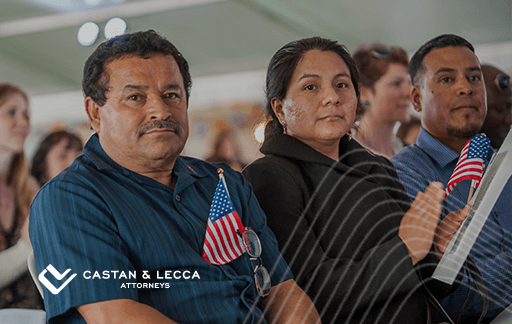
Becoming a naturalized American citizen is a major, life-changing process. It spans many different components, so it’s important to be aware of all the details when undertaking this journey.
Leading up to this point, you’ve worked hard to build a life for yourself and your family. You’ve sacrificed, fought hard, and you’ve succeeded. Perhaps you are currently a lawful permanent resident, but are seeking something more. Now is the time to enjoy all of the benefits that the United States has to offer.
Naturalization is the process by which a lawful permanent resident obtains naturalized citizenship. If you were born in a country outside of the United States, you may be eligible to become a “naturalized” citizen.
When becoming a naturalized citizen as a lawful permanent resident, you must submit Form N-400 with all necessary documents. It also can include tests, fees, an interview, a biometric test, and a ceremony.
In this latest blog post, we break down the requirements for the naturalization process. It isn’t easy, but staying informed of the process makes you aware of the challenges that may arise.
Prove Age and Residence
To become a naturalized citizen in the United States, you must prove your age and your residence. At the time of the filing, you must be at least 18 years old. The age of 18 is considered the threshold of adulthood in the United States.
If you are embarking on the naturalization process as a lawful permanent resident (a green card holder), then you must have been living in the United States for the past three or five years. The exact length of time depends upon the naturalization category you belong to.
According to the United States Citizenship and Immigration Services, you must “have lived for at least three months in a state or USCIS district having jurisdiction over your place of residence.”
An important factor to note is that you must also demonstrate that you have continuous and physical presence in the country. Be prepared to present evidence of your required time in the United States as well as your age.
Demonstrate Your Morals and Loyalty
In addition to proving your age and residence, you must demonstrate morality and loyalty during the naturalization process. You must show that you are a person of “good moral character” and have been so for the time span of five years before the filing of your application.
There are certain circumstances that permanently bar someone from achieving citizenship based upon moral character. These include committing murder, aggravated felony, genocide, or severe religious persecution, among others.
In addition to proving good moral character, you must also demonstrate a certain level of attachment toward the ideals that the United States holds. This includes a loyalty to the US and a support of the ideals and principles of the United States Constitution, which is the supreme law of the land.
Beyond this, you must also recite an Oath of Allegiance for the United States. This oath occurs during the last portion of the naturalization process at the naturalization ceremony.
Demonstrate Your Knowledge
When becoming a naturalized citizen, you must prepare to demonstrate knowledge of the United States, its government, and its history. In order to do so, you must take the Citizenship Test. This test largely focuses on civics and history.
In addition to the citizenship civics test, you must also prove your knowledge of English by writing one of three sentences and reciting one of three sentences.
It is important to note that if you are of a certain age and have lived in the US for a certain period of time, you may be exempt from the English test. It’s always best to consult with an experienced attorney so that you can plan accordingly.
Fortunately, there are many different online resources that you can use to prepare for these tests. The United States Citizenship and Immigration Services provides some helpful tools to use (like practice tests) so that you can be confident in your knowledge on the testing day.
Demonstrate Proof of Marriage to a US Citizen
If you choose to become a naturalized United States citizen through marriage to a US citizen, then you must show proof of that marriage. In addition to providing proof of age and residence, and morality and knowledge of the United States and the English language, you must also be prepared to provide documentation and discuss your marriage to prove its legitimacy.
Demonstrate US Military Status
If you have served in the United States military as a lawful permanent resident, you may choose to seek naturalized citizenship through that status. While the requirements for serving during peacetime differ from serving in wartime, you still have to complete the civics and English tests. To determine which category you fall into, see the Immigration and Naturalization Act, sections 328 & 329. You also have to complete the N-400 Form.
In addition to that form, you must also complete Form N-426, Request for Certification of Military or Naval Service. Because the citizenship process through US military status can be complicated, especially if you are serving abroad, it’s best to seek guidance during this time. If you want to receive a free consultation of your case, contact Castan & Lecca today.
Be the Child of a US Citizen
In certain cases, you can seek naturalized citizenship merely through parentage. If your parent or parents are United States citizens, you may be eligible to become a citizen yourself. There are two ways that you can do this: either at birth or anytime before the age of 18.
If you were born outside of the United States to one or more U.S. citizens and your parent(s) lived in the United States for a certain period of time, then you could choose to seek citizenship through this path.
According to the USCIS, a “child” is a person who is the “genetic, legitimated or adopted child of a parent.” It also includes “the son or daughter of a non-genetic gestational US citizen mother” who is “recognized as the child’s legal parent.”
In order to seek citizenship through parentage and you are in the United States, you must complete Form N-600. If you are outside of the United States, you must complete the N-600k form.
While it may seem that applying for citizenship through parentage is a simple process, it can get complicated. Everyone’s case is different. Therefore, it’s important to know the facts and seek professional guidance before you submit your application.
Starting the Naturalization Process
While the naturalization process may seem overwhelming at first, the outcome is always worth the time and effort. It’s important to keep in mind that you need to confirm your eligibility and then provide evidence of it and evidence of identity.
You must also demonstrate your knowledge of the United States, its history, and its government, as well as knowledge of the English language. In addition to that, you must take an Oath of Allegiance to the United States and prove that you are of good moral character.
Furthermore, you must also be aware of the details surrounding your unique circumstances. This can include marriage to a US citizen, serving in the US military, or being the child of a US citizen. These particular circumstances could require you to complete different forms or provide different evidence.
Because the naturalization process can become complicated, it’s best to seek out professional legal assistance when you undertake this journey. At Castan & Lecca, we are here to help you achieve your dream of becoming an American citizen. Give us a call today to set up a free consultation of your case.









